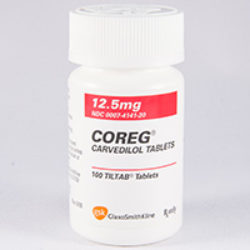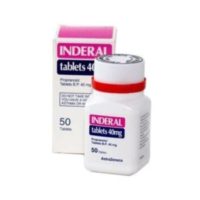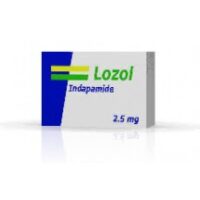Description
Drug Uses
Coreg is used for treatment of high blood pressure and mild to severe heart failure. Coreg may be used alone or with other medications. It may also be used for other conditions as determined by your doctor.
How Taken
Take Coreg as directed by your doctor. Coreg should be taken with a meal. Taking Coreg at the same time(s) each day will help you remember to take it. Continue to use Coreg even if you feel well.
Warnings/Precautions
Before taking Coreg, tell your doctor or pharmacist if you have any medical conditions, especially if you have allergies to medicines, if you are allergic to any ingredient in Coreg, if you have an adrenal gland tumor, diabetes, low blood sugar, liver problems, overactive thyroid, anaphylaxis, chronic bronchitis, chronic obstructive pulmonary disease (COPD), emphysema, or other lung disease, if you have heart failure, Prinzmetal angina (chest pain due to coronary spasm), slow heartbeat, narrowing of blood vessels of the legs, arms, stomach, or kidneys, or kidney problems, if you are pregnant, planning to become pregnant or are breast–feeding. If you plan on becoming pregnant, discuss with your doctor the benefits and risks of using Coreg during pregnancy. It is unknown if Coreg is excreted in breast milk. Do not breast–feed while taking Coreg. Some medicines may interact with Coreg. Therefore tell your doctor of all prescription or nonprescription medicine, herbal preparation, or dietary supplement that you are taking. Tell your doctor if you are scheduled to have surgery or receive anesthesia. Do not take Coreg if you have asthma, a very slow heartbeat, very low blood pressure, heart block, or severe liver disease. If you have angina or have had heart problems, do NOT suddenly stop taking Coreg without first consulting with your doctor. Severe chest pain, heart attack, very fast heartbeat, and irregular heartbeat may occur. If your doctor decides you should no longer take Coreg, the dosage should be gradually reduced according to your doctor’s instructions. If you are a heart failure patient, talk with your doctor if you experience weight gain or increasing shortness of breath. Coreg may mask signs of low blood sugar, such as a rapid heartbeat. Other symptoms, such as sweating, may still occur. Coreg may affect blood sugar levels. If you are a diabetic your doctor may need to change the dose of diabetes medicine you take. Check blood glucose levels regularly. Coreg may cause decreased tearing (dry eyes) in patients who wear contact lenses. Before having any surgical or dental procedures or receiving emergency treatment, tell the doctor or dentist in charge that you are taking Coreg. Additional monitoring of your dose or condition may be necessary if you are also taking decongestants, hydralazine, and rifampin, medicines for asthma, diabetes, or thyroid conditions. Lab tests, including blood pressure checks, may be performed to monitor your progress or to check for side effects. Be sure to keep all doctor and lab appointments. Elderly patients may be more sensitive to Coreg. These patients may require a lower dose or/and special monitoring during treatment. Do not use Coreg in children younger than 18 years old. Safety and effectiveness in this age group have not been confirmed.
Missed Dose
If you miss a dose take it as soon as you remember. However if it is almost time for the next dose, skip the Missed Dose and continue your regular dosing schedule. Do not take a double dose to make up for a missed one.
Possible Side Effects
Some of the Possible Side Effects are– Change in vision, diarrhea, dizziness, drowsiness or trouble sleeping, dry eyes (especially if you wear contact lenses), lightheadedness, nausea, and slow heartbeat, swelling of the legs, unusual tiredness or weakness, weight gain. Contact your doctor if any of these or other side effects occur. If you experience any of the following serious side effects, you should seek medical attention immediately– allergic reactions (rash, hives, itching, difficulty breathing, tightness in the chest, swelling of the mouth, face, lips, or tongue), bluish discoloration of hands or feet, chest pain, dark urine, fainting, flu–like symptoms, increased thirst, increased urination, loss of appetite, pounding in the chest, severe dizziness, slow heartbeat, swelling, tenderness of the upper right part of the stomach, unusual bruising or bleeding, yellowing of the skin or eyes.
Storage
Store Coreg below 86 °F (30 °C). Store away from heat, moisture, and light. Do not store in the bathroom. Keep Coreg out of the reach of children.
Overdose
If overdose is suspected seek medical attention immediately. Some of the symptoms of Coreg overdose are– difficulty breathing, especially when lying down, fainting, lack of heartbeat, lightheadedness, especially upon standing, seizures (convulsions), severe dizziness, shortness of breath, unconsciousness, very slow heart rate, vomiting, weakness, wheezing.
More Information
Coreg may cause dizziness and lightheadedness. These effects may worsen if Coreg is taken with alcohol or certain other medications. Use Coreg with caution. Do not drive or perform other possibly unsafe tasks until you know how you react to this drug. If your symptoms do not improve or if they worsen, contact your doctor. Coreg should be used only by the patient for whom it has been prescribed. Do not take less or more or take it more often than prescribed by your doctor.
Disclaimer
This is only general information, it does not cover all directions, drug integrations or precautions. You should not rely on it for any purpose, it does not contain any specific instructions for a particular patient. We disclaim all responsibility for the accuracy and reliability of this information. We`re not responsible for any damage.





Reviews
There are no reviews yet.